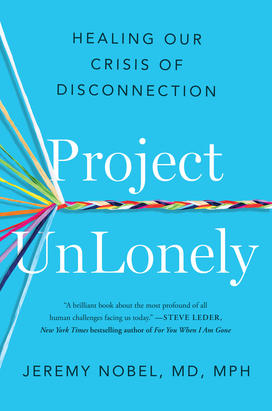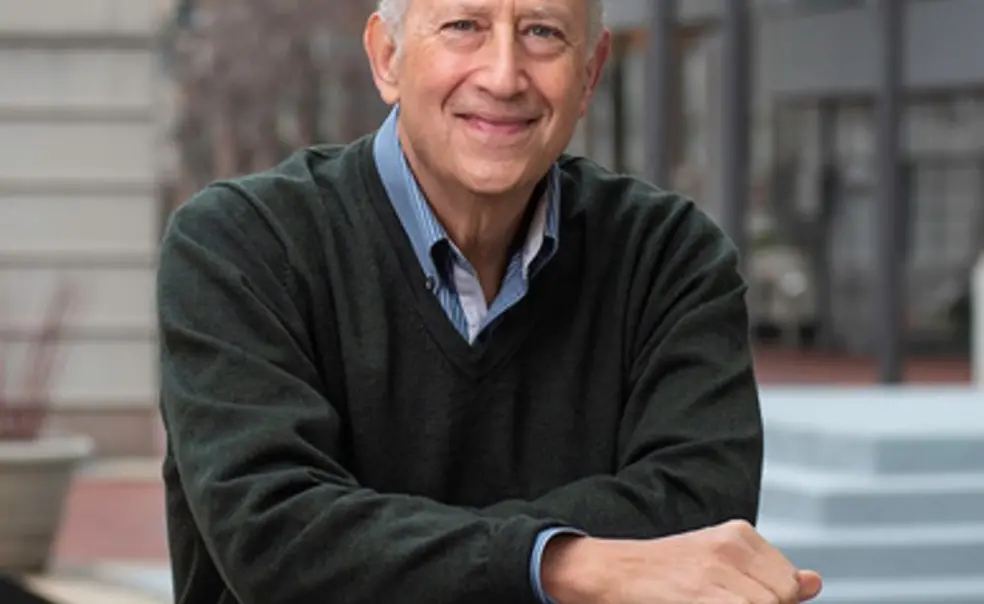Jeremy Nobel ’77 Offers Insights into Human Loneliness and Hope for Lasting Solutions in New Book
The Book: Project UnLonely (Avery) explores loneliness and how its manifestations can have devastating consequences on individuals. Chronic illness has been a conversation that has circulated for many years, but the COVID pandemic brought this topic to new heights. Nobel weaves an interesting narrative on how we may combat loneliness, offering hopes for comfort and connection. He accomplishes this, in part, by bringing together a diverse cast of voices, from researchers to healthcare providers to average people struggling with loneliness in their day-to-day lives. His expertise, combined with fascinating insights from his interviews of others, leads him to conclude that one of the best solutions lies in cultivating a sense of creativity in our lives. This book provides a steady hand to lean on while navigating a new normal.

The Author: Jeremy Nobel '77 is a primary care physician and public health practitioner. He has faculty appointments at the Harvard T.H. Chan School of Public Health and the Harvard Medical School. He founded and is currently the president of the Foundation for Art & Healing, a nonprofit organization that promotes creative arts as a means of healing and a way forward for patients. Project UnLonely is its signature initiative, focused on raising national awareness of the negative health effects of loneliness. Nobel is also an award-winning poet.
Excerpt:
The Loneliness Crisis
This is not the book I thought I was going to write.
I had begun 2020 with excited anticipation of great things for Project UnLonely, the nonprofit initiative I’d launched in 2016 to address the growing problem of chronic loneliness. Little did we know at Project UnLonely that we were about to enter the loneliest year in modern history.
In March, I was scheduled to speak on a panel at SXSW, the annual South by Southwest conference in Austin, Texas. I’d be sharing the podium with Julianne Holt‑Lunstad, one of the foremost researchers on the subject of loneliness and a fellow public health evangelist who’d become a friend in recent years. For months, together with our other panelists, we had been planning our presentations, along with other events we hoped would draw media attention to this urgent social issue. I was also excited to be visiting Austin again, to catch up with some college buddies who are part of Austin’s vibrant music scene, and to perhaps find some new friends for our cause among the many thought leaders who converge at SXSW every year. Texas in March is also much warmer than suburban Boston, where I live. I was looking forward to that, too.
April would bring an exciting set of new milestones for Project UnLonely. Thanks to generous grants from the AARP Foundation and the UJA‑Federation of New York, we were prepared to launch nine of our “Creativity Circle” workshops for older adults in Illinois, New York, and Maine. By partnering with a variety of community‑based organizations in these states, we aimed to demonstrate for the first time at scale the healing power of arts and conversation in bringing people together and encouraging them to stay connected. Also, that month, I had a meeting set with the head of health services at Harvard to discuss the problems of on‑campus belonging and connection, and I was scheduled to lead a keynote panel on loneliness at the American Society on Aging’s annual conference in Atlanta.
All these plans and many more began unraveling during the pandemic’s first week, in March 2020. After Washington State declared a public health emergency on February 29, major SXSW exhibitors pulled out, including Seattle‑based Amazon. Our panel discussion, titled “Connecting IRL: The Antidote to Loneliness,” was canceled, along with most others. Then, on March 6, the city of Austin announced it was shutting down the entire SXSW conference. No one would be connecting IRL in Austin that year.
The American Society on Aging canceled the Atlanta conference, and my meeting at Harvard was postponed. Then our whole nine‑city Creativity Circle project fell apart. One by one, the various hosting organizations notified us they were terminating all in‑person programs. The New York sites were first to cancel, then Maine, then Illinois. Our initial hope in April was that these were all mere temporary postponements. But as COVID outbreaks spread throughout the nation and the world, we gradually learned like everyone else to start thinking in new, unfamiliar terms—in terms of utter uncertainty.
A Pandemic of Loneliness
We are no longer facing the pandemic crisis. We are living in the pandemic era. The post‑2020 world remains one of uncertainty and loneliness. The two go together. Uncertainty breeds loneliness in a fairly predictable emotional progression. Any experience of uncertainty makes us feel vulnerable, because if we don’t know what’s coming, we don’t know if we can handle it. Feeling vulnerable in turn leads to anxiety, our biological response to threat. Anxiety tells your body to prepare to fight or flee, to breathe faster and pump more oxygenated blood to your muscles.
In that physical state, anxiety directs our mental focus toward the priority of survival. But we aren’t hardwired to endure perpetual anxiety. Anxious minds stuck in survival mode are more concerned with protecting than connecting. Risk‑averse minds will avoid human contact when possible. Vulnerability, driven by uncertainty, breeds anxiety, and anxiety breeds loneliness as we go into a defensive crouch and back away from those around us.
These are uncertain and lonely times. COVID‑19 has created a vast landscape of trauma for millions of people from loss of work, loss of relationships, and loss of loved ones to the deadly virus. True, we are all weathering the same storm, but as the saying goes, we are not all in the same boat. We are in different boats, and some boats withstand the storm better than others. The experience of loneliness is highly personal and subjective, so the pandemic’s reality has allowed some people to find safe harbors, while others are taking on water or slipping beneath the waves.
For some, the increased solitude granted time at home to invest deeply in their most intimate relationships. Many others were lonelier and unhappier than ever. The activities and social rituals that helped give meaning to their lives were gone. Millions were forced to endure agonizing months without seeing close loved ones, and without the everyday interactions that give life its social texture. The comforting hugs at family gatherings, in houses of worship, at birthdays, weddings, and funerals were suddenly unavailable.
The shared storm did not bring us together. The long‑simmering grievances over police abuse of lethal force, social inequality, and the vacuum of leadership concerning issues of race exploded in the pro‑ tests, marches, and riots of 2020. For a wide variety of reasons, the post‑2020 world is one of expanding inequality, a terrible real‑life social psychology experiment that has created mental health problems for 40% of the US population.
Excerpted from Project UnLonely: Healing Our Crisis of Disconnection by Jeremy Nobel, MD, MPH with permission of Avery, an imprint of Penguin Publishing Group, a division of Penguin Random House LLC. Copyright © Jeremy Nobel, 2023.
Reviews:
“This grand tour of loneliness visits the pain of subjective experience, the insights of science, the threat of technology, and the promise of art to discover solutions to one of the great public health issues of our time. In our hyper-connected but ultra-isolated world, we all need Project UnLonely.” —Thomas Insel, former director of the NIH and author of Healing: Our Path from Mental Illness to Mental Health
“Loneliness is a silent epidemic that no one talks about (because there is no one to talk to about it). Jeremy Nobel is the best friend and confidante we all need. Project UnLonely offers practical guidance and scientific context on how to fight loneliness in individuals and societies. His evidence-based approach elevates artistic expression to its rightful position of being as important as diet, exercise, and sleep.” — Daniel J. Levitin, PhD, New York Times bestselling author of Successful Aging










No responses yet